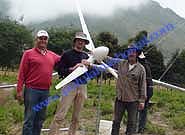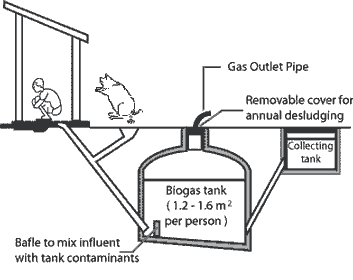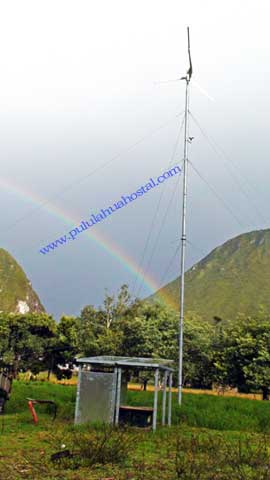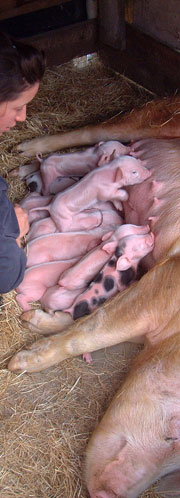EFFICIENT ENERGY USE
SUSTAINABILITY AND TOURISM
The definition of sustainable development by the World Commission on Environment and Development (WCED) and the United Nations is: Meets the needs of the present generation without compromising the ability of future generations to meet their own needs.
The Pululahua Hostal is focused on Sustainable Ecological Tourism. For this reason we have installed several eco-friendly systems to minimize the environmental impact that we produce.
The Pululahua Reserve is very fragile and vulnerable due to its proximity to Quito, La Mitad del Mundo, and it´s unique makeup that attracts locals and foreigners to it´s volcanic caldera. For this reason it is necessary that tourism within the of Pululahua Volcano and it’s Geobotanical Reserve be channeled to protect the environment.
One of the Ecological systems is our organic farm which allows us to be self-sufficient with organic products and to employ people from our community. The purpose of the organic farm is to provide healthy food for tourists interested in visiting the Pululahua Crater without harming the environment.
In august of 2008 we installed our first renewable energy system consisting of a 1 KW wind generator with a 13 m tower, two 130 W solar panels, one hybrid solar and wind battery charger, a 1500 W sinusoidal inverter and battery recharger, two 160 Ah deep cycle batteries, and an energy meter. This hybrid system was design to meet 100 % of the lighting needs of our cabañas and to provide a sustainable ecological tourism.
We are currently designing two additional renewable energy systems to minimize our impact on global warming. The thermo-solar systems will be installed this year to provide with hot water heating for the showers and for the Jacuzzi. Also we are designing a biogas energy harvesting system to provide us with gas for cooking and additional heating. Our goal is to evaluate and increase the use of these systems to minimize the impact that tourism causes on the environment. At the current subsidized energy prices we will not be able to lower our operating costs; instead we are investing our financial resources to help the environment. We believe that these renewable energy sources must be installed by all who can afford to help maintain the health of our home Mother Earth.
HYBRID SYSTEM INSTALLED BY PROVIENTO


Wind Generator Photovoltaic Panels
Water Recovery Systems
This is a very important issue because all the water supply comes from the fog that condenses on the vegetation on the hill La Monja. The fog and the hill are under pressure. The fog comes from moisture accumulated in the rain forest of Esmeraldas, this region is under enormous pressure from destruction by uncontrolled logging. La Monja hill is also at risk by the closeness to agricultural production. Each summer the corn stubble is burned, the fire and the summer winds threaten the vegetation responsible for water condensation.
In our hostal and farm we put a great deal of effort to minimize the use and waste of this vital fluid. In the cabañas, kitchens, and whirlpool, we installed pipes to collect the water and to send it to a recycled water tank. This water is used to irrigate our garden and sixty fruit trees.
The rainwater is channeled from the ceilings and sent to a tank of drinking water (still under construction), in which the water is filtered and purified for human use.
In our organic farm we collect the water used to wash the pig farm, spent water from a kitchen sink, and a shower from the caretaker’s house. This water is collected in a tank that is emptied twice a week. This water, rich in nutrients, is distributed in our organic farming.
The Organic Fertilizer
The design of our pig stalls allow to separate the water from the solid waste. All solid waste is collected for composting which is converted into organic fertilizer for crops. In the same way we compost all of the waste material generated by the guinea pigs, chickens, and horses.
By the end of next year we are planning the installation of a more comprehensive system to exploit production bio-gas (natural gas generated from the decomposition of organic matter) to be used in our stoves, hot water heaters for the showers and whirlpool. The effluent from this system will be a better fertilizer and as an extra bonus the presence of flies and odors will be reduced.
Production of Organic Food
We produce organic alfalfa, yellow corn, white corn, morocho, beans, and peas. We also have had good results with vegetables such as lettuce, cabbage, carrot, radish and beet.
The corn and alfalfa are fed mainly to the pigs and horses. A small portion of it is consumed by the guinea pigs, and chickens, which in turn produce eggs. Chicken, eggs, pigs, and guinea pigs are our main source of organic protein produced. Horses that eat most of the organic alfalfa generate a good portion of our sales tourist.
We also buy several organic products produced in an area. Especially to families who subsist on their agricultural production. One of these products is organic coffee which is harvested by native farmers who live in the mountains west of the Pululahua Crater. This coffee, possibly of the Arabica type, was brought by the Spaniards and spread by the birds, it grows in the heights of 1600 to 1800 m and lives under the shadow of the rain forest trees in the area. The coffee we produce is of a very good taste, good flavor and body. Tourists can buy our coffee and can also participate in the process of roasting.
Organic Farming
The agricultural practices within the crater have been mostly green. The natives of this area used oxen for plowing and preparing land for sowing. All planting is done by hand and a hoe is used to clean the weeds after they germinate. Later the oxen is used again for a final plowing called “chikta” which helps bury grasses that compete with the crop.
We have adopted these environmental practices in our own crops. These practices help preserve the environment without causing additional burdens to global warming. Our tractors are a small horse Creole called Zeus and a small hairy burrito called “Peluche”. These animals have learned to pull the plow and contribute to the ecological work to control weeds without the use of pesticides.
Production costs are too high to compete with mechanical processes, but we achieved a small profit by using these products in the main dishes we serve to our customers.
Handling Garbage
All organic wastes from the restaurant are consumed by pigs. The remaining inorganic waste is separated and classified to bring it to recycling centers.
Employment
We are proud to work with the community of Pululahua for three years supporting a few families. The community has been our source of workers for the organic farm, construction, and tourism guide. They have also been a source of knowledge for the operation of our ecological farm


Above is a funny sketch of some of our future plans to generate more energy.
On the rights is picture showing our wind generator and solar panels decorated by a rainbow.


Tel: (593) 0999466636 - 0991914333
Phone:
593-999466636
593-991914333
Mail:![]()
Copyright © 2006 - 2016 Pululahua Hostal
Link to local weather stations INAMHI